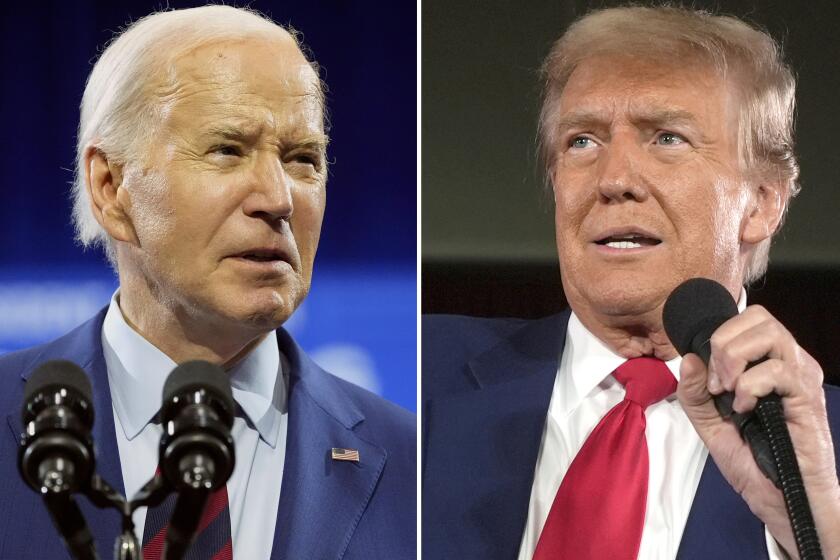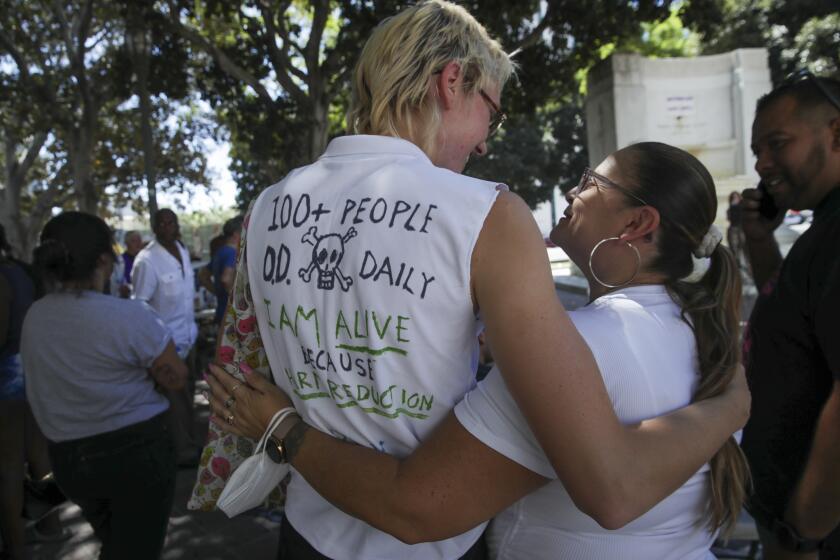NEWS ANALYSIS : High Court Decisions May Alter Rules for Making Laws
Just five years ago, the rule was simple. If members of Congress saw a national problem, they wrote a federal law.
Critics often said the laws did not work but almost no one doubted that Congress had the power to write the laws. In recent years, new federal measures have targeted violence near abortion clinics, guns near schools, carjacking, hazardous waste dumps, the scourge of crack cocaine, “deadbeat parents” and weapons in the hands of ex-felons.
But now, writing federal laws “has suddenly gotten a lot more complicated,” said Vanderbilt University law professor Barry Friedman. And the fate of several of these new federal laws is in some doubt.
That is so because in three key decisions, the Supreme Court has undercut the power of Congress and bolstered the independent authority of the states.
Four years ago, the justices declared that the federal government may not “commandeer” state or local officials to administer federal programs.
Last year, the court said Congress may not regulate in an area except where it has a “substantial” link to interstate commerce. Matters such as education, crime and family relations should be left mostly to the states, the court said in striking down the federal Gun-Free School Zones Act.
And on Wednesday, the court said Congress cannot authorize private lawsuits against the states to enforce its laws on the environment, bankruptcy, copyrights or American Indian affairs.
To some constitutional law experts, the decisions represent the most dramatic shift of government power since the New Deal of the 1930s.
The sweep of the rulings is not just a matter of academic interest. The high court opinions already have spawned a series of lawsuits contesting many of President Clinton’s prized legislative accomplishments.
“The lower courts are percolating with challenges to the whole Clinton agenda,” said Yale University professor Akhil Amar.
Last week, in a little noted decision, the U.S. appeals court in New Orleans struck down as unconstitutional part of the so-called Brady Act, which requires a five-day waiting period for the purchase of a handgun.
A three-judge panel, citing the high court’s 1992 ruling, said the law is unconstitutional because it “commandeers” local sheriffs to conduct federally mandated background checks on purchasers.
A Justice Department attorney said Thursday that the ruling will be appealed to the Supreme Court in hopes of saving the law.
Meanwhile, three federal judges have said the anti-carjacking law is unconstitutional. Others have struck down new laws protecting abortion clinics and targeting “deadbeat parents” who fail to pay child support. Judges have opined that those problems are state matters, not federal issues.
Last August, the U.S. appeals court in California struck down part of the federal arson statute. It threw out an arson conviction against a couple who burned down their home to collect $4 million in insurance payments and reasoned that a crime involving a private, noncommercial building had no “substantial” link to interstate commerce. Therefore, the federal law went too far, the appeals court said.
No one can predict with confidence whether the Supreme Court opinions signal the beginning of a true constitutional revolution or whether they merely announce an outer limit for Congress’ power.
However, the outcome for now almost surely depends on Justice Anthony M. Kennedy, a moderate conservative from Sacramento who has cast the fifth and deciding vote in each of the high court’s recent decisions on states’ rights.
In three cases, including Wednesday’s ruling, Kennedy joined with the conservatives to boost states’ rights. But last year, he joined the liberal side to form a 5-4 majority that struck down state laws mandating term limits for members of Congress.
“Kennedy is the loose, nervous vote on this issue,” said Friedman, an expert on federal-state relations. “I think the Brady [Act] is very much in jeopardy, but I would be surprised if they go as far as to strike down the federal abortion-clinic access law or the Child Support Recovery Act,” which targets deadbeat parents, he said.
Lawyers representing the states also said the court’s decisions do not necessarily portend dramatic changes.
“These justices are not revolutionaries. These are reasonable, incremental decisions that make clear the states and the federal government are co-sovereigns,” said Richard Ruda, counsel for the State and Local Legal Center here.
Of the three recent rulings, Wednesday’s decision barring most private lawsuits against the states is least significant.
“It probably won’t have much practical effect. Only a few statutes are involved, and Congress still has lots of tools it can use,” said Georgetown University law professor Vicki Jackson.
The most significant ruling, she said, was last year’s declaration that Congress can regulate only “activities having a substantial relation to interstate commerce.”
Speaking for the court in the case known as Lopez vs. the United States, Chief Justice William H. Rehnquist said the Constitution gave the federal government powers that “are few and defined,” while those held by the states are “numerous and indefinite.”
That opinion “has set off the real ferment in the lower courts,” said Notre Dame University law professor Douglas Kmiec.
For example, does a carjacking on a city street have a “substantial relation” to interstate commerce, or is it instead a routine matter of local crime?
Does the problem of crack cocaine make for a federal crime, or is it like the possession of a gun near a school, a typical local crime?
What about violence outside an abortion clinic? Can that be viewed as a federal crime because women cross state lines to get abortions, or is it too a state and local matter?
“Until the court answers the hard questions growing out of Lopez, we won’t know where this will all come out,” Kmiec said.
More to Read
Start your day right
Sign up for Essential California for news, features and recommendations from the L.A. Times and beyond in your inbox six days a week.
You may occasionally receive promotional content from the Los Angeles Times.







